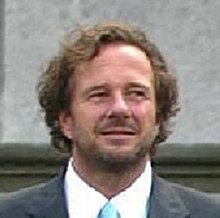Herman Heinsbroek
This biography of a living person needs additional citations for verification. (February 2021) |
Herman Heinsbroek | |
|---|---|
 | |
| Member of the House of Representatives | |
| In office 15 May 2002 – 22 November 2006 | |
| Personal details | |
| Born | Herman Heinsbroek 19 October 1951 Schiedam |
| Nationality | Dutch |
| Political party | Pim Fortuyn List (2002) |
| Occupation | Politician, businessman, author |
Hermanus Philippus Johannes Bernardus Heinsbroek (born 12 January 1951) is a Dutch entrepreneur and was Minister of Economic Affairs in the First Balkenende cabinet.
Personal life[]
Heinsbroek was born in Schiedam and grew up in Rotterdam. His father was the General Manager of the Blankenheim & Nolet gin distillery.[1] Heinsbroek studied business and civil law at the Erasmus University, graduating in 1975.
He started out as a diplomat in the Ministry of Foreign Affairs. After a brief time there, he left to work at CBS Records. In 1979 he was hired as Managing Director of Arcade Records Benelux. Through a management buy-out in 1984 he acquired the majority of the shares of the company. Over the years he built it into one of the largest independent players in the European music business, with affiliates in 11 countries plus the US, called The Arcade Entertainment Group. The company also owned Indisc, CNR Music, music retail chain The Music Store, Vanguard Classics, Arcade Music Publishing, Arcade Video, Radio 10 Gold, Concert Radio, Love Radio and music television station TMF. In 1995 Arcade was sold to Wegener N.V.
Heinsbroek is known as a collector and connaisseur of Contemporary Art, in particular Chinese Art[citation needed].
He is a member of the supervisory board of Belinco N.V.
His first novel, a thriller entitled Risky Game, was published in 2015.
Political career[]
Heinsbroek served in the first Balkenende cabinet as Minister of Economic Affairs, representing the Pim Fortuyn List (LPF). His resignation, which came after continued public battle with fellow LPF member and Minister of Health, Welfare and Sport Eduard Bomhoff. Heinsbroek was one of the reasons for the collapse of the cabinet.[2] Following the collapse, 2002, Heinsbroek founded his own party, the List of New Politics (LNP), initially with the intention of participating in the parliamentary elections on 22 January 2003. The LNP's program included important elements from the LPF's manifesto. However, the idea was abandoned after Heinsbroek announced that he could not find enough suitable candidates to participate in the elections.
Heinsbroek was briefly associated with the Democratic Political Turning Point (DPK) party in 2012.[3]
References[]
- 1951 births
- Living people
- Dutch businesspeople
- Ministers of Economic Affairs of the Netherlands
- Pim Fortuyn List politicians
- 21st-century Dutch politicians
- Dutch corporate directors
- Erasmus University Rotterdam alumni
- People from Schiedam
- Dutch politician stubs
